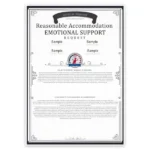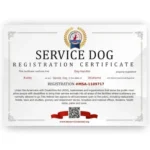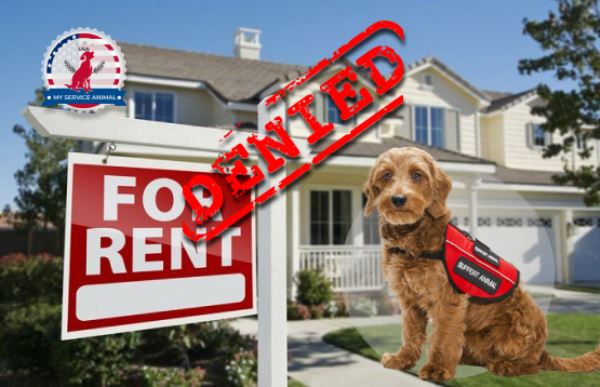Humans with inabilities can often feel cut off from the world and society. They have special needs, and asking someone for help is often difficult. That is why service animals are especially popular among such humans. These creatures are expressly tamed to perform almost any tasks of their owners. Moreover, the constant vicinity of an animal nearby gives a person peace of mind and significantly reduces stress levels.
For many men with disabilities, the constant presence of a service animal is vital. Consequently, special laws have been developed that regulate the rights of animal helpers. Service animals can go along with their owner anywhere and can dwell with them without any extra fee. Free accommodation with the handler also applies to emotional support animals, but in other areas, ESAs’ rights are significantly limited.
In this article, we will detail how to rent a flat if you have a service or emotional support animal. And also what documents are required and what else you need to know in order to do it legally and avoid conflict situations with the landlord.
Renting an apartment with ADA pet
Most landlords do not allow pets in their buildings. Thus, they are trying to secure their property and the safety of other residents of the place. And this is not surprising, because many animals, for instance, dogs, especially large fighting breeds, really can gnaw or scratch the landlord’s property. In addition, a lot of people are afraid of large animals because they see them as aggressive and out of control. To avoid these and other unpleasant situations associated with the residence of a pet in the building, it is easier for the housekeepers to absolutely prohibit the dwelling of pets.
Nevertheless, there is another option. The housing provider often demands an additional fee for the animal’s residence. Moreover, he or she can ask about a deposit from the tenants, which, in the case of necessity, will be used to pay losses. Therefore, if your pet is not a service animal or you do not have an ADA letter from a qualified therapist, we recommend choosing pet-friendly landlords and places to live in. In the case of service animals and emotional support animals, things are distinct.

Service animals’ access
A man with incapability and his or her service animals are advocated by federal law. The basic law for animal helpers and their owners is the Americans with Disabilities Act. This principle determines the rights and access of service animals. It also defines what constitutes discrimination against disabled humans and guarantees them the opportunity to enjoy enhanced rights in relation to their disability-related needs.
For example, service animals can lead their owners to any public place, including cafes and restaurants, and can only be removed if they pose a threat to others. Service animals can fly in the cabin of a plane next to their owner. In this case, the animal needs special equipment. There is no need for the animal to wear special equipment or service animal recognition clothing in everyday life. In addition, service animals can reside with their handlers and use common places in the building at no extra charge.
Documents for service animals
To officially register your service animal, you first need to get a document from your GP. This paper will be proof that you have a disability. In addition, only a competent person in the field will be able to find out whether a service animal would be beneficial in your certain situation.
If you already have such evidence from a GP and you have chosen a pet, you might order an ADA Dog ID card that will confirm the status of your pet. You can find some ADA paperwork and proceed order with the MyServiceAnimal registrar.

Indispensable records for ESA
If your animal is not a dog or mini support animal horse you might register a support animal. All you need for an emotional support animal to legally reside with you is an ESA letter issued by a licensed professional. The ESA letter is a special deed that confirms that you really need an emotional support animal to improve your psychological or emotional circumstances.
To place your ESA with you, it is enough to give this document to the manager and make a special request. The housing provider is obliged to consider your query and provide a response within 10 days. In most cases, if the ESA letter meets all requirements, the landlord’s response will be positive. Otherwise, he or she must provide reasons for his or her refusal. If you believe that there are no sufficient grounds for refusal and you regard the action of the hosting provider as discrimination, you can contact the Department of Housing and Urban Development to file a complaint. After the ESA letter will be issued, you can order an Emotional Support Animal card for your extra comfort.
In the case of renting with ESA please find information in our article: Renting an Apartment with an Emotional Support Animal.
What is the meaning of ‘reasonable accommodation request’?
A reasonable accommodation involves making changes or adjustments to subsisting building rules or policies. Such changes can be made by the owner of the building or a trusted person, such as an authorized realtor. This is necessary in order to avoid narrow-mindedness and to grant people with inabilities the opportunity to freely rent housing, regardless of their disability-related needs.
Even so, you should not forget that reasonable accommodation does not mean special equipment of the building for the needs of tenants with impairments. Such changes must be agreed upon with the landlord in advance. At the same time, the costs of equipment and its installation are most often divided by the parties in half.
How to make a reasonable accommodation request
You can write and submit a request only in person or, in case of incapacity of the tenant, such an application can be made on his behalf by authorized humans, for instance, family members. Providing a reasonable housing Accommodation Request must be justified. It denotes that the landlord may request additional documents, such as a doctor’s letter, to ensure that the pet’s residence is necessary.
It is important to talk to the housekeepers as early as possible, explain your situation to them, and ask them to make an exception or change the rules. You must also clearly explain what kind of accommodation you need and, in some cases, you must explain how it is connected to your disability. If you do not make a formal request, the landlord has the right not to allow you to stay with a service animal.
There is no specific form for this request. This may be an oral agreement or a written document signed by both parties. However, the law still recommends that this document be drawn up in writing so that in the event of a violation of your rights, you will have documentary evidence.
You can learn How a Reasonable Accommodation Request Can Help in our blog.

What a landlord can’t do?
With both service animals and emotional support animals, there is a list of things a landlord cannot demand from their tenants. First of all, the dwelling provider cannot claim a complementary emolument or deposit for the residence of the animal. Service animals are specially trained in behavior, so you can explain to your landlord that the animal is docile and will not pose a threat to people or impair possessions. However, if the animal does damage the landlord’s property, you may be asked to pay damages or make repairs at your own expense.
The landlord cannot deny you accommodation based on their preconceptions about your issues. Also, he cannot refuse you to argue this with the type, breed, or size of a service animal. Such actions are legally regarded as discrimination and a violation of human rights, which you can directly declare to the housing provider.
In addition, the landlord cannot ask you about the details of your dysfunction. All the necessary information for him is in the documents provided. Disclosure of any other records, including diagnosis, symptom, course, and results of treatment, is solely up to you.
Cases in which housing providers can deny accommodation
In fact, there are few situations in which a landlord can prohibit accommodation with a service animal. Most of them relate to situations where tenants cannot provide the necessary documents or documents are fake. Also, the landlord may refuse to live with a service animal if this will impose significant financial losses on him or her.
However, there are cases in which the law does not oblige housing providers to make exceptions or indulgences in the rules. For example, this applies to houses in which there are 4 or fewer units, in one of which the landlord lives. This also applies to single-family houses. A separate category is hotels that are not permanent residences. Before booking a hotel room, it’s best to check if the hotel allows pets and talk to the administration about service animal accommodation.
How to protect your ADA pet rights?

Refusing to accommodate people with disabilities of any kind and their service animals is a violation of federal law. There are penalties for this. Therefore, if you feel or believe that your rights are being violated and you are being discriminated against, you can contact the Department of Justice to resolve the situation.
You can file a formal complaint, which the government is required to consider and make its decision. You also need to provide evidence that your rights have been violated. If the discrimination is confirmed, the landlord will be subject to preventive measures, such as the obligation to pay you a penalty or compensation.
But first of all, talk to your hosting provider. Try politely reminding him or her that there are laws and each side must abide by them. Any disputable situation can be resolved through dialogue and if the parties are ready to compromise.

























